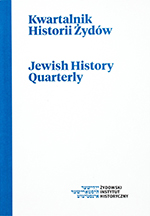Polityka społeczna samorządu m. st. Warszawy względem żydowskich mieszkańców stolicy (1919-1939) – według relacji prasowych
Warsaw Local Government’s Welfare Policies Vis-a-vis the City’s Jewish Population (1919-1939) – According to Press Accounts
Author(s): Hanna Kozińska-WittSubject(s): History, Recent History (1900 till today)
Published by: Żydowski Instytut Historyczny
Keywords: Warsaw; interwar years; local government; municipal welfare policy; social care; Jewish care institutions; city subsidies
Summary/Abstract: The author looks at the municipal social policies of Warsaw’s local government vis-a-vis the Jewish inhabitants of the city in the interwar period. For comparison, it presents the standards of action of the city authorities during the partitioning of Poland, when, until 1907, the Jews in need had to rely solely on aid from the Jewish religious community, while after that year the authorities began to provide partial funding to some commune institutions. This practice was continued by the Warsaw local government formed in 1919. finansować niektóre instytucje gminy. In its actions for the benefit of the Jews in need, the local government got some relief from foreign charitable organizations. The crisis of 1929 led to a total bankruptcy of local government bodies and facilitated the control over it by the authoritarian state authorities. Since then the Warsaw local government delegated its welfare responsibilities toward the Jews to the religious community, while at the same time taking over the religious institutions by “neutralizing” their religious character. In the authoritarian 1930s most of the efforts of local government bodies focused on modernizing the peripheral districts, which were predominantly inhabited by non-Jews. There were also plans to modernize the city centre, which was to consist in the demolition of neglected areas of it, where the Jews lived. As regards the effects of interventions by Jewish town council members, they were sometimes successful in the 1920s but in the 1930s their effectiveness was negligible, which could have contributed to radical shifts in the composition of the self-government bodies after the last election held in 1938.
Journal: Kwartalnik Historii Żydów
- Issue Year: 267/2018
- Issue No: 03
- Page Range: 491-546
- Page Count: 56
- Language: Polish

